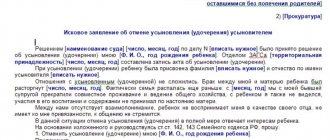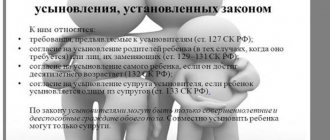Disclosure of the secret of adoption against the will of the adoptive parent, committed by a person obliged to keep the fact of adoption as an official or professional secret, or by another person for mercenary or other base motives, is punishable by a fine of up to eighty thousand rubles or in the amount of wages. or other income of the convicted person for a period of up to six months, or compulsory work for a period of up to three hundred sixty hours, or correctional labor for a period of up to one year, or arrest for a period of up to four months with deprivation of the right to hold certain positions or engage in certain activities for a period of up to three years or without it.
Comments on Article 155
The object is the interests of the family, the right to inviolability of family secrets.
Comments:
- The norm is special to Article 137. Code, which provides for liability for violation of privacy. According to Art. 139 Family Code, adoption is protected by law.
- The judges who made the decision on adoption and other persons possessing such information are obliged to maintain this secret. In the absence of the will of the adoptive parent, disclosure of secrets is punishable by law. Due to this peculiarity, cases under this article are held in a closed format, including the announcement of the decision. All persons involved are cautioned of the responsibility for disclosing adoption information. This information is reflected in the minutes of the meeting and certified by the signatures of all participants.
- The objective side is actions to disclose secrets to at least one person, including the adopted child, without the consent of the adoptive parent.
If the threat of disclosure of information is associated with extortion, then the actions are qualified under Article 163 and do not require additional qualification under Article 154. The subjective side is direct intent. The person understands that he is violating a secret, but wants to commit such actions. If the secret of adoption is disclosed by the adoptive parents themselves, this does not constitute a crime.
Subject – special or general, over 16 years old. The first is a person obliged to maintain professional secrets. The condition for the emergence of responsibility in a common subject is the presence of self-interest or base motives. Common subjects are teachers, educators, relatives, and other persons.
The danger lies in creating a threat to the preservation of the family, causing psychological trauma to children and adoptive parents. One part of the article establishes the main elements of a crime of minor gravity. The method of disclosure of information, including to third parties, does not affect qualifications; it can be oral, written, or other. A crime is committed for self-interest if the person disclosing it is entitled to money, valuables, property services, or the fact of avoiding material costs. Base motives - envy, jealousy, revenge.
Persons obliged to keep secrets are a judge, a civil registry office employee, guardianship and trusteeship authorities, a prosecutor, an inspector for minors. If one of the spouses disclosed information against the will of the other, then he can be prosecuted under Art. 155.
The type of knowledge in the form of the secret of adoption with one-way access does not carry any character. Therefore, not every violation constitutes a criminal act. Information may be disclosed to the inquiry, investigation, prosecutor's office, or judge - this does not constitute a crime. You also cannot be held liable for giving notice of the cancellation of an adoption. Without starting points, a crime is a trial of public guilt.
Adoption
This form is the best way to accommodate single children. This institution of law is regulated by International Law and is clearly prescribed by the Family Code.
It is allowed to adopt children under 18 years of age whose father and mother have died or have been deprived of parental rights by a court order.
When choosing a future family, they take into account the interests of the minor, his origin, religion, and native language. Relatives of the minor have priority. It is forbidden to separate siblings.
Citizens of the Russian Federation permanently residing in the country and abroad can adopt a child. Foreign citizens, except those who have American citizenship, or those living in the United States, become the parents of a small Russian citizen if it is impossible to find a suitable family within their native state. Children are put up for adoption 12 months from the date of receipt of data about them in the federal database.
It is prohibited for the following persons to adopt children:
- recognized by a court as incompetent or limited in legal capacity, and their spouses;
- deprived of parental rights;
- in respect of which there is a court ruling on the termination of adoption or guardianship;
- those convicted of grave and especially grave crimes;
- sentenced by a court to punishment for crimes of low and medium gravity, in the absence of an expunged criminal record. If a citizen has served his sentence in full, and the time required by law has expired since the offense, he can become an adoptive parent, provided he has his own home, the necessary means of subsistence, and the absence of diseases and bad habits.
- suffering from diseases that exclude the possibility of accepting a child into the family. The list of diseases is determined by the Federal Law of the Russian Federation and includes: tuberculosis, HIV infection, oncology, disability of non-working groups I and II, alcoholism, drug addiction, schizophrenia. If the listed conditions are detected, the child’s blood relatives, stepmother and stepfather are denied access.
- without registration and permanent residence, with the exception of representatives of the nomadic peoples of the Far North;
- not working anywhere, without the opportunity to provide the child with a living wage established by regulations;
- who are same-sex spouses;
- who have not completed the pedagogical training established by the Government.
Representatives of different sexes who have not registered their marriage cannot jointly adopt an adopted child.
If you want to raise a child alone, you must take into account the age difference, which is at least 16 years.
The adoption process takes place through civil proceedings, in the presence of persons who have expressed a desire to raise a minor, a representative of the guardianship and trusteeship authority, and a prosecutor. When a minor reaches 14 years of age, he will be asked to remain in the courtroom. To consider the case, a statement from the interested party is required. There is no state fee when submitting this paper.
The hearing takes place behind closed doors, and all persons present sign a non-disclosure document. This measure is based on ensuring the secrecy of the adoption of a child.
If a minor father and mother have not been deprived of parental rights by a court order, their written consent is required to take him into their family. Persons who gave birth to a child before the age of 18 give consent together with their legal representatives.
When submitting an application by one spouse, the voluntary consent of the second is required.
A mother who abandoned her baby in the hospital may later change her decision.
What is it for
It is important to understand that disclosing the secret of adoption is fraught with the development of a negative atmosphere in the family, which can lead to divorce of spouses, cancellation of adoption or unlawful actions on the part of members of the family union. . Contrary to the Conventions on the Rights of Children, which opposes concealing the fact of adoption, as this is contrary to human rights
Contrary to the Conventions on the Rights of Children, which opposes concealing the fact of adoption, as this is contrary to human rights.
The secrecy of adoption can entail moral and legal problems, therefore in Russia a decision has been made on its non-disclosure in order to neutralize the threat of these problems arising.
The following procedures are also kept secret:
- protection from attempts to take the baby away from the foster family by his blood relatives;
- ensuring a comfortable climate in the family, relationships based on mutual understanding and love;
- protection from mental and moral ill-health of children in foster families, since often the news of the absence of family ties among family members can cause irreparable damage to the mental health of the child;
- protection from blackmail from third parties who exert pressure under the pretext of disclosing secrets;
- responsibility for disclosing the secret of adoption provides protection from the provision of information about the adoptive parents to the child’s biological parents, who “in time” came to their senses about their involvement in raising the child.
Modern trends in glasnost give the right to assume that, following the example of the West, the secrecy of adoption and the threat of its disclosure will soon be abolished in Russia. This measure will eliminate all obstacles to finding blood relatives if necessary.
How to prove a crime has been committed
Another secret
Secret information that also affects the personal life of a citizen and is protected by law includes medical confidentiality. The concept of “violation of medical confidentiality” includes disclosure of a diagnosis (especially significant for a person when they find out his HIV-positive status), dissemination of information about mental health, the results of diagnostics, tests, and prescribed treatment. You can read about responsibility for disclosing medical confidentiality in the article https://lexconsult.online/6340-ponyatie-vrachebnoi-tainy-nakazanie-za-ee-narushenie.
The elements of the crime provided for in Article 155 are formal, that is, immediately after the disclosure of information to any person, the crime is already considered completed, for this there is no need to wait for certain consequences to occur.
Proving the fact of disclosure of secrets in practice is quite a difficult task. The situation is especially difficult with proof of the vile intentions of the offender.
First of all, in order for the disclosure of the secret of adoption to be punished by law, it is necessary to find the person who disseminated the information. The involvement of a specific person in a crime can be proven using the testimony of witnesses (the adopted person or strangers to whom the information was communicated) or documentary evidence:
- Recording a conversation;
- Letter;
- SMS message;
- Post on social networks, etc.
What is disclosure of the secret of adoption?
The Family Code of the Russian Federation in Article 139 provides that the fact of adoption of a child by a family is protected by law. Unfortunately, the RF IC does not explain the concept of secrecy of adoption. Only in 2015, the Constitutional Court dated June 16, 2015 No. 15-P gave some guidelines for what this category represents.
Important! The degree of confidentiality is determined by the parent himself. If the requirement for secrecy is not set by the adoptive parents, then the disclosure of such information is not subject to criminal punishment
Thus, when the following information is made public, liability arises:
- change of surname, name and patronymic;
- place and date of birth, which can also be changed at the request of the adoptive parents (it is established that the date of birth is adjusted within the range of three months);
- information about the court hearing at which the issue of changing the child’s status was decided;
- data on the provision of maternity leave instead of adoption leave;
- medical information about the child’s metrics;
- other information that adoptive parents do not want to disseminate.
Thus, in addition to the Family Code, the requirement to maintain the secrecy of the adoption of a child is contained in the norms of the Code of Civil Procedure of the Russian Federation (form of conducting a court hearing), legislation on acts of civil status (information on the issuance of a certificate with changed data of the child), legislation on the provision of medical activities ( metrics of the adopted child), the Labor Code of the Russian Federation (providing maternity leave) and, naturally, the Constitution (guarantees for adoptive parents of non-interference in personal and family secrets).
This constitutes the subject matter of the crime. Criminals are officials of these bodies.
If the parents have not established a regime of secrecy in relation to information about the appearance of a child in the family, then there is also a need to obtain their permission to disseminate such information. If a child, at the moment of “entering” the family, is able to realize that the parents are adoptive parents, then he also acts as a steward of the secret. For example, a minor does not want his peers to know that he does not live with his biological parents.
The corpus delicti under Article 155 of the Criminal Code of the Russian Federation assumes that the circle of persons in respect of whom information can be illegally provided is unlimited, that is, the child himself is included in this indefinite list of subjects. This unlawful act is characterized by direct intent. Since there is no material basis (deriving benefits), the crime is formal.
The legislator did not provide for differences in the ways in which the offender was able to disclose information (correspondence, oral conversation or the use of special means of communication will be punished equally).
https://youtube.com/watch?v=7mrkgXYX5H0%3Ffeature%3Doembed
Why should you keep a secret?
The Basic Law of the State establishes the right of every person to personal and family secrets (Article 23 of the Constitution of the Russian Federation). When deciding to adopt, parents accept responsibility for the child, including his physical and mental health.
The main reasons for keeping secrets are:
- protection from attempts to remove the baby;
- protecting the family from excessive attention from strangers;
- ensuring psychological comfort;
- protection from interference of biological parents in raising a child.
The advantage of keeping a secret is that minors recognize that they belong to a family. In addition, when inheriting, the child has the same rights along with other close relatives.
Among the disadvantages of the secrecy of the procedure is the fear of adoptive parents that information about adopted children will become available to unauthorized persons.
When there is no punishment
It happens that after the adoption procedure, the adoptive family, for some reason, refuses to raise and support the child, or the authorized bodies raise the issue of canceling the adoption. In this case, the confidentiality regime is canceled. Moreover, if information is transferred to other bodies for the implementation at the proper level of state social policy (the Commissioner for Children's Rights), then such disclosure will not be considered illegal.
Thus, it is up to the adoptive parents to establish a regime for preserving information about the appearance of a child in the family. It is legally determined that such a violation is a criminal offense due to the limitation of constitutional guarantees.
Judicial practice under Article 155 of the Criminal Code of the Russian Federation
The practice in court under this article is not so great. In many situations, the guilty people in such cases do not concern the list of specialized entities, but are considered only by other citizens:
- example: technician cf. school, born in 1954, out of low motives, revealed the secret event of the adoption of her own child. As stated in the verdict, through personal influence she put her daughter, who had not reached the age of eighteen, into a state of stress. She was punished in the amount of 2,500 rubles;
- a citizen born in 1956, who did not work and also out of low motives, told the minor citizen by phone number about the actual event of her adoption. The basis for this was considered to be the condition that the person who adopted the girl had previously resolved all housing issues with the guilty citizen, and then left for another girl. The punishment for this was the following - compulsory labor for a period of one year with a deduction of 10% from the salary to the country's profit.
So it is realistic to imagine the conclusion that the crime provided for in Art. 155 of the Criminal Code of the Russian Federation, without sufficient starting points, is classified as a public guilt proceeding.
Such an offense affects the individual non-property interests of the child and his new parents and entails to a great extent a private, individual characteristic.
And it would be quite correct to include in the legislation a request for the initiation of such criminal proceedings at the request of the relatives of the adopted child, with the further completion of the case in the situation of their renunciation of guilt.
What does the law say?
Responsibility for disclosing the secret of adoption is provided for in Art. 155 of the Criminal Code of the Russian Federation. The article belongs to the section on crimes against family and minors. If, along with the disclosure of a secret, there was a fact of blackmail or demand for services, then Art. 163 of the Criminal Code of the Russian Federation – extortion.
Responsibility for disclosing the secret of adoption
Commentary on Article 155 of the Criminal Code of the Russian Federation
Commentary edited by Rarog A.I.
1. Disclosure of the secret of adoption, which is rightly called the tragedy of exposure, threatens the collapse of the created family. Therefore, family legislation establishes a number of rules designed to ensure the secrecy of adoption. Yes, Art. 135 of the Family Code provides for the possibility of changing the place and date of birth of the adopted child in the relevant documents, the prohibition without the consent of the adoptive parents (and in the event of their death, without the consent of the guardianship and trusteeship authorities) to report any information about adoption, to issue extracts from civil registration books, from which we can conclude that the child is adopted. At the request of the adoptive parent, the child is assigned the surname of the adoptive parent, as well as the name indicated by him (Part 2 of Article 134 of the Family Code).
2. According to Art. 273 of the Code of Civil Procedure of the Russian Federation, the court considers cases of adoption of a child in a closed court session. The Plenum of the Supreme Court of the Russian Federation explains that the final decision in such a case itself is announced in the absence of the public. At the same time, persons participating in the consideration of the case must be warned about the need to keep information about adoption that has become known to them secret, as well as about the possibility of bringing to criminal liability for disclosing the secret of adoption against the will of the adoptive parent, which is reflected in the protocol of the court session (clause 6 of the Resolution of the Plenum Supreme Court of the Russian Federation of July 4, 1997 “On the application by courts of cases on establishing adoption”).
3. The object of this crime is the intangible conditions for the normal development and formation of the minor’s personality.
4. From the objective side, the disclosure of the secret of adoption is the communication to the adopted person, as well as to any other person, of information about his actual origin, i.e. about who his blood parents are, as well as other circumstances and details related to this. The form of such communication (oral, written, anonymous) has no legal significance. Disclosure of information about an adoption that is not legally formalized in the proper manner (actual adoption) does not constitute a crime. The adopter’s consent to the disclosure of the fact of adoption, regardless of the motives for this consent, for example, because of the desire to prepare the ground for the cancellation of the adoption, excludes the existence of a crime, because the law associates the disclosure of secrets with the condition “against the will of the adoptive parent.” The crime is completed regardless of the occurrence of any socially dangerous consequences.
5. From the subjective side, this crime is characterized by direct intent. Moreover, the actions of persons to whom the fact of adoption became known in connection with official or professional activities can be motivated in any way, and if the fact of adoption was disclosed by other persons not belonging to the above two categories, the corpus delicti will be present only if they acted from selfish or other base motives. We are talking, in particular, about “selling” the secret of adoption, using it as a means of blackmail during extortion, as well as out of revenge, envy, hooligan motives, etc.
6. Disclosure of the secret of adoption associated with extortion is qualified under the totality of Art. Art. 155 and 163 of the Criminal Code.
7. Subjects provided for in Art. 155 of the Criminal Code, crimes are divided into two groups. The first includes special subjects - persons to whom the fact of adoption became known in connection with their official or professional activities. These are, first of all, employees of local government bodies who in one way or another came into contact with the adoption case through their work, as well as a lawyer who advised interested participants in the adoption process, etc. The second group includes all other persons (a common subject) who have reached the age of 16 age, aware of the fact of adoption, including any of the spouses in whose family the adopted person is, if he acted against the will of the other spouse.
Composition of a criminal offense
The composition of a criminal act includes the subjective and objective side, the subject and object of the crime.
- Subject
The subject can be special or general. The first include persons whose professional duties involve maintaining secrecy (a judge, the director of a shelter, an employee of the registry office), and the second include any persons who disclosed information for selfish or malicious purposes: relatives, neighbors, teachers and other citizens, more or less closely communicating with family.
- Subjective side
It represents the dissemination of information against the will of the adoptive parent. A crime is such only if there is intent. For example, one of the relatives may blackmail the couple by telling the child who his true mother and father are, demanding money for silence. In this case, if the secret is revealed, he is the culprit and deserves criminal punishment. There is evidence of the criminal’s interest, selfish intent (to get money and ruin family relationships) and the act itself.
If the parents gave the go-ahead for the disclosure of the secret, or the child was already aware that he was taken into care, the fact of disclosure is not regarded as a crime. It doesn’t matter whether the parents themselves told the child or someone else with their consent, there is no corpus delicti.
Dissemination of information against the will of the adoptive parent
- An object
The object of the crime is social relations that were violated by someone’s illegal actions. Human rights and freedoms are considered a common object. The generic object is the rights of the individual, the specific object is the rights of minors. And the immediate object is the right of children to grow up and be educated in a full-fledged family and in a psychologically comfortable environment. Dissemination of information can be a direct threat to the child’s peace of mind and a way to disrupt family relationships.
- Objective side
The objective side is actions aimed at revealing the secret of adoption to at least one person, including the child himself. The crime differs in its formal composition - that is, it is considered committed from the moment the information was disclosed.
When can the secret of adoption be revealed? The Constitutional Court answered this question.
To prevent or diagnose hereditary diseases, to avoid marriages with blood relatives, it is necessary to know who, in fact, our relatives are. And if in an ordinary family you can find out about this from relatives and in most cases get the necessary information, then in families where children were adopted, this is impossible without the consent of the adoptive parents. At least that's how it used to be.
What has changed now? In fact, as long as the adoptive parents are alive, their consent is still required to disclose the secret of adoption. But the situation is completely different if they die.
On the one hand, the law establishes an indefinite ban on disclosing the secret of adoption
On the other hand, information about biological parents may be vital for their descendants. This means that refusal to provide such information may violate the rights of citizens.
For example, when we are talking about a possible marriage with a relative, because knowing some facts, this could be avoided, and therefore hereditary diseases could be prevented. Every person has the right to health care – this right is guaranteed by the Constitution. Both motherhood and childhood are protected. And if life and health depend on the availability of some information, then maybe in certain cases this information should become accessible?
In this regard, when issuing Resolution No. 15-P of June 16, 2015, the Constitutional Court of the Russian Federation recognized that Art. 139 of the Family Code of the Russian Federation and Art. 47 of the Law “On Acts of Civil Status” do not contradict the Constitution of Russia. The court noted that these provisions of the law do not in themselves prevent the receipt of the necessary information about adoption by court decision. True, descendants can receive it only after the death of the adopted child and adoptive parents. But such information can be provided only to the extent that is necessary for them to exercise their constitutional rights. This means that simply out of curiosity, it will not be possible to find out in detail who the ancestors were.
So, it turns out that the secret of adoption without the consent of the adoptive parents can be revealed, but certain conditions must be met:
1. The application for disclosure of the secret came from a descendant of the adopted person - outsiders will not be able to obtain this information. However, we should not forget that citizens can conduct their cases in court not only personally, but also through representatives. This means that in the interests of the child, his mother can apply, even if she is not a descendant of the child’s adopted ancestor. In addition, no one has canceled the opportunity to issue a power of attorney for representation in court.
2. The decision on whether to reveal the secret of adoption or not is made by the court - no one else has the right to assume such powers.
3. The adopted person and the adoptive parents have already died - it is this circumstance that makes it impossible for descendants to receive information from them.
4. Disclosure of the secret of adoption is necessary for descendants to exercise their constitutional rights. Do not forget that the right to information itself may be limited by law, as is the case with adoption. But the death of the adopted child and adoptive parents can be considered a special circumstance. And given that disclosing the secret of adoption may be necessary to respect the right to health care, the situation is somewhat different. But in any case, the final decision is up to the court.
5. Disclosure of the secret of adoption should not upset the balance of rights and responsibilities of other people related to adoption. If someone wants to find out information about their ancestors simply out of curiosity, then it is worth thinking about whether other relatives of their ancestors and the ancestors themselves want this? It is not for nothing that the secrecy of adoption was established - in order to balance the interests of the largest possible circle of people, because we are talking about a very delicate area of human relations.
And although while the adoptive parents are alive, only they can decide whether to divulge the secret of adoption or not, their descendants still have the opportunity to learn about their biological relatives.
In fact, the ban on disclosing the secrets of adoption was partially lifted. However, as always, good enforcement practices are of great importance. When going to court, the descendants of the adopted person will have to prove and justify the reasons why they would like to receive information about their ancestors.
Adoption procedure
The adoption process is laid down in detail in Article 125 of the Family Code. The main points of the procedure are as follows:
- Procedurally, only a court can grant parental rights to a minor.
- In accordance with Article 269 of the Code of Civil Procedure, you should apply for a decision to the district court at the place of registration (child, adoptive parents).
- It has been established that representatives of the prosecutor's office and the OPP must be involved in the hearing.
- In addition, the above departments are required to conduct a preliminary comprehensive examination of the case.
- It is permissible to involve other persons in the hearing who have important information:
- teachers;
- guardians.
- Biological parents are not involved in the court hearing unless they have lost the right to assert their legal authority to raise and support the child.
- The adoption decision may be canceled by the court if a violation of the law is discovered.
Important: the court decision comes into force from the day it is made.
Parents acquire all the rights in relation to a minor as set out in Article 12 of the Family Code. The court transmits the adopted and formalized decision to the registry office within three days. Registry office specialists initiate the registration of the baby’s documents in a standard manner based on the information received.
Download for viewing and printing:
Civil Procedure Code of the Russian Federation dated November 14, 2002 N 138-FZ (as amended on December 19, 2016) (as amended and supplemented, entered into force on January 1, 2017)
Adoption progress
In practice, a court hearing is preceded by several stages, during which mandatory expert activities are carried out. Namely:
- Obtaining the status of candidate parents.
- Familiarization with the list of orphans.
- Child's choice.
- Getting to know him, establishing contact.
- Collection of documents for the court hearing.
- Process and getting the final decision.
Attention: the list of children subject to adoption is compiled by the Public Promotion Office at the place of their birth or residence at the time of loss of parental care. All information goes into a federal data bank and is available to each approved parent candidate.
How to obtain candidate status
The decision on whether a citizen can become an adoptive parent is made by the OPP. To do this, they must provide evidence of full compliance with legal requirements. The list of documents includes:
- Biography.
- Certificates about place of work, income, property, housing.
- Information about your health status based on a comprehensive medical examination.
- Information about the composition of the current family, including the presence of an officially registered marriage.
Attention: OPP specialists make a decision within five days. However, as a rule, they need to additionally:
- interviews with candidates;
- survey of living conditions;
- collection of other information characterizing the candidate (from the place of duty, from neighbors and other persons).
Preparatory activities
Citizens who have received written approval from the PPP for candidate status are required to carry out the following work:
- Prepare living conditions for the child.
- View the list of children for adoption. It is posted on a special website, the address of which will be given by guardianship specialists.
Attention: it is recommended to familiarize yourself with the literature on raising children and attend foster parenting courses.
Child selection and introduction
As a rule, adoptive parents already have an idea of what kind of baby they want to take into the family. If the choice is not made, then you should contact:
- any organ of the PPP;
- to the federal (regional) operator.
Once a candidate for adoption has been identified, it is necessary to begin communicating with the baby. This will require special permission from the OPP. It is necessary to write a corresponding statement indicating the details of the baby and his location.
Download for viewing and printing:
Sample application for adoption
Important: in the process of considering the case of placing a minor in a family, the fact that candidate parents have established contact with him is taken into account.
Expectant parents are allowed to visit the baby for ten days (extended if necessary). At the same time, the management of the institution:
- promotes communication between potential family members;
- ensures that candidate parents do not harm the child, including instilling false hopes;
- has no right to interfere with communication or divert the attention of potential parents to other orphans;
- provides candidates with complete and detailed information about the child, his state of health, and biological parents (if any).
Collection of documents for court
When the baby has been identified and contact has been established, it is necessary to prepare for the court hearing. The work is carried out by two parties:
- Candidates assemble their own package.
- The child’s documents are prepared by:
- guardianship;
- administration of the institution in which he is located.
Potential parents, in addition to the above documents, will need to prepare:
- statement of claim;
- copies of adoptive parents' birth certificates;
- documents on the conclusion or dissolution of marriage;
- confirmation of the status of a candidate for adoptive parents;
- written consent to the act of adoption of interested parties.
Attention: there are many nuances associated with confirming income or possession of property. They should be sorted out with a lawyer or guardianship specialists. A candidate for adoptive parents must not provide false information. This will lead to a negative decision by the judicial authority.
Final decision
The end of the process is the issuance of a court decision. As a rule, adoption cases are prepared especially carefully.
This leads to the fact that negative court verdicts are rare. If one is issued, it is allowed to challenge it within ten days. Attention: in order not to receive a court refusal to adopt, it is necessary to remove in advance all obstacles to placing a minor in a family. Adoption example
A married couple raising a young son has broken up. The child remained with his mother. Soon the woman remarried. The relationship between her new husband and her son developed in the best possible way. The woman decided to legitimize them.
She turned to her former husband for permission to adopt. He refused, although he was not interested in the fate of his son and did not support him financially.
On the advice of guardianship specialists, the woman filed a statement of claim in the district court. Its essence was the requirement to establish paternity over a son in favor of the current spouse, with the deprivation of the right of a parent to the former husband. When considering the case, the court was guided by the following logic:
- Article 129 of the Family Code prohibits changing paternity without the consent of the biological parent (and it has not been obtained).
- However, the law allows for the deprivation of the right to vote of a citizen who does not fulfill parental duties in relation to children, due to their:
- material support;
- education.
- The list of situations in which adoption is carried out without taking into account the permission of the biological father is contained in Article 130 of the Family Code.
- In the situation under consideration, evidence was provided of the lack of interest on the part of the biological father in his son and financial assistance (he did not pay for more than 6 months in a row). In addition, the woman tried to find him and contacted the Ministry of Internal Affairs. The search yielded no results.
- The court granted the applicant's request.
Where to apply, sample application
To restore justice, the injured party must apply to a court of general jurisdiction to file a claim to bring the perpetrator to justice. A sample application can be found on the Internet or contact a criminal or family lawyer. In any case, the following mandatory details of such an application exist:
- the header indicates the name and address of the court, information about the plaintiff and defendant;
- the preamble of the statement of claim indicates facts that allow us to judge that the rights of the child and his adoptive parents have been violated;
- when describing the situation, emphasis should be placed on what negative consequences for the child’s moral state occurred after he learned about the secret;
- in conclusion, the intention to bring the person to criminal liability is indicated.
Meetings on this type of case are always closed, and the presence of third parties is unacceptable. The injured party has the right to combine claims and, together with this, present a demand for the recovery of moral damages from the offender. To determine the amount of compensation, it is necessary to attach documents about applying to specialized medical organizations (psychological care offices), and receipts for drug treatment of the teenager’s condition. In this case, the violator will face both criminal and financial liability.
What it is
The secrecy of adoption is the concealment of the fact from the person being adopted that a child is accepted into the family by non-biological parents, in order to ensure the safety of his interests and not to violate the moral and pedagogical education in the adoptive family.
This article of Russian legislation, unlike Western countries, is strictly protected by law.
Contrary to all justice, disclosing a secret can cause moral suffering to the child and interfere with his upbringing in a foster family, ultimately leading to conflicts within the family.
All persons participating in the event are required to keep knowledge of it to themselves. But, the secret is not protected, contrary to the opinion of the adoptive parents, if they do not consider it necessary to hide the fact of the absence of family ties with the children.
This is possible for educational purposes or when children were adopted at a conscious age.
What responsibilities are provided?
Criminal liability for disclosing information about adoption occurs after the disclosure has taken place. This crime belongs to the category of completed crimes and cannot be either ongoing or continued.
The Criminal Code of the Russian Federation establishes both primary and additional punishment for this category of case. The main ones include:
- penalties not exceeding 80 thousand rubles (can be replaced by the amount of salary for the last six months);
- compulsory work – no more than 15 days;
- correctional labor – no more than 12 months;
- arrest – no more than 4 months.
Additional penalties include a ban on holding positions or conducting certain activities for a period of no more than 3 years. Since the sanction of the article does not contain a punishment in the form of imprisonment, the imposition of an additional punishment in terms of the term coincides with the main one.
https://youtube.com/watch?v=GRqpfz5X8LE%3Ffeature%3Doembed
Reasons for the need for confidentiality
The main reason is the protection of the rights of the child and his legitimate interests. In addition, parents, hiding the truth, are guided by the desire to prevent injury: psychological or emotional. Sometimes disclosure even entails the cancellation of the adoption, since it becomes unbearable for the child to live in a family in which the fact of his adoption was hidden.
Ensuring secrecy
Article 139 of the RF IC provides a whole range of measures that would help parents keep the fact of adoption secret.
For example, it provides the following:
- holding a trial in closed form, i.e. A strictly limited list of persons related to the procedure is invited to the process.
- At the request of the parents, you can change: the child’s full name, his place of birth.
- It is not the biological parents who are entered into the birth book, but the adoptive parents.
- You can change the date of birth, but for a period of no more than 3 months. Important condition: the child should not be more than a year old. Also, such a decision is made only in court at the hearing at which the issue of adoption is considered.
Features of maintaining secrets and the possibility of disclosure
The secret of adoption must be preserved only if the adoptive parents themselves desire it. In most cases, this is what happens, information can be reliably hidden from strangers, and children adopted in infancy do not even suspect that they have other biological parents.
There are other cases when adoptive parents do not consider it necessary to hide their true origin from the child. Despite the legal protection of the secrecy of adoption and the punishment provided for in the Criminal Code, this aspect is not a mandatory component of adoption. In principle, the decisive factor is the will of the adoptive parents.
Occasionally, there are cases when “new” parents do not want to hide the fact of adoption from their adopted child. Some consider such a decision necessary, guided by moral motives, linking it with children’s rights and other considerations, while others take it for pedagogical purposes. Only adoptive parents have the right to disclose the secrets of adoption, and no one else, especially officials.
It is impossible not to take into account cases when maintaining the secrecy of adoption becomes impossible for objective reasons. For example, if you take into a family a ten-year-old child who already understands everything perfectly and knows that he had biological parents, but they died or abandoned him. Perhaps the baby even remembers them.
By the way, a citizen of another state can also adopt a child. Read more about international adoption in Russia.
Definition of the concept
Article 137 of the RF IC states that adoption is a legal procedure for the emergence of a special relationship between the adoptive parents and the adoptee.
They are equal by law to the relationship between parents and children.
Article 139 of the Family Code of the Russian Federation explains that judges and other officials who participated in the adoption procedure must conceal this information and not tell the child about it.
This is the secret of adoption. However, if the new parents themselves are not against the baby knowing about his origin, then there is no violation of the law.
Immediately after the court decision on adoption comes into force, responsibility for disclosing the secret begins. This is how the law protects the child from violation of his rights and the dissemination of confidential information.
Important: if the child is 10 years old, the secrecy of adoption ceases to be valid. At this age, the child must decide for himself whether he will go to a foster family or not.
and All civil servants have a clause in their job descriptions, according to which they must keep confidential information secret. In this regard, it is much easier to prove their guilt.
Art. 155 of the Criminal Code of the Russian Federation, distribution of secret information about adoption
Article 155 of the Criminal Code of the Russian Federation talks about the penalties that will follow for disclosing the secret of adoption.
Dissemination of secret information against the will of the adoptive parent, carried out by a person who must preserve the actual event of adoption as an official or special secret, or by another citizen out of selfish or disfavored actions, is punishable by the following method:
- a fine of 80 thousand rubles. in the salary or other income of the prisoner for up to six months;
- forced labor up to 360 hours;
- corrective labor for up to 1 year;
- taking into custody for up to 4 months with the deprivation of legal authority to work in specific professions or take on some work for a period of up to 3 years or without such a period.
Based on this, we can briefly draw the conclusion that punishment for the committed criminal act will follow if a certain person commits the fraud presented above. Fines or other negative sanctions are imposed due to various circumstances that led to the commission of an illegal act.
Legislative regulation
- Convention of the UN General Assembly on the Rights of the Child of November 20, 1989;
- European Convention on the Adoption of Children of November 27, 2008;
- Constitution of the Russian Federation of December 12, 1993;
- Family Code of the Russian Federation of December 29, 1995 223-FZ;
- Criminal Code of the Russian Federation of June 13, 1996 n 63-FZ;
- Decree of the President of the Russian Federation of June 1, 2012 No. 761 “On the National Strategy of Action in the Interests of Children for 2012-2017”;
- Resolution of the Plenum of the Supreme Court of the Russian Federation on 2004.2006 No. 8 (as amended on December 17, 2013) “On the application of legislation by courts when considering cases of adoption of children.”
What judicial practice shows
In judicial practice, this article is often found, since adoption is common in Russia. Anyone can reveal the secret. But more often, adoptive parents do not go to court because they do not know that there is criminal liability for this.
Examples of cases:
- Citizen E. worked in the guardianship and trusteeship authorities. They called him on the phone and identified themselves as a police officer, asking him to give information about the adoption of one of the children from a local official. E. did not know that he was being deceived, so he gave away the secret. Soon she became known to the media. The court began an investigation and found E. He confessed to his crime and admitted guilt. The investigation took this into account and sentenced him to a fine and compulsory labor due to the fact that E. was misled.
- Citizen G. adopted a little girl who was 9 months old, but she didn’t remember anything. Then G. got married without telling her husband anything about the procedure. One day, in the heat of a quarrel with her husband, she told him a secret, which came as a shock to him. He filed a lawsuit because his daughter also found out about this and fell into depression. G. was sentenced to community service and a fine of 20 thousand rubles for causing moral damage.
- Citizens P. and R. were married and adopted a boy from an orphanage. After 5 years they separated, the boy remained with his mother. During one of his meetings with his father, already at the age of 14, the boy learned that he was adopted. P. specifically told him this, trying to humiliate him and show that he did not owe him anything in terms of alimony. The mother filed a lawsuit because the disclosure was against her will and caused mental harm to the child. P. was arrested for 3 months and ordered to pay moral damages.
What decisions are made under Article 155?
The article is rarely made public, because a secret is a secret, no one wants to give it away. In 2021, there were 3 cases under this article, 1 case ended in correctional labor and 2 in compulsory labor.









